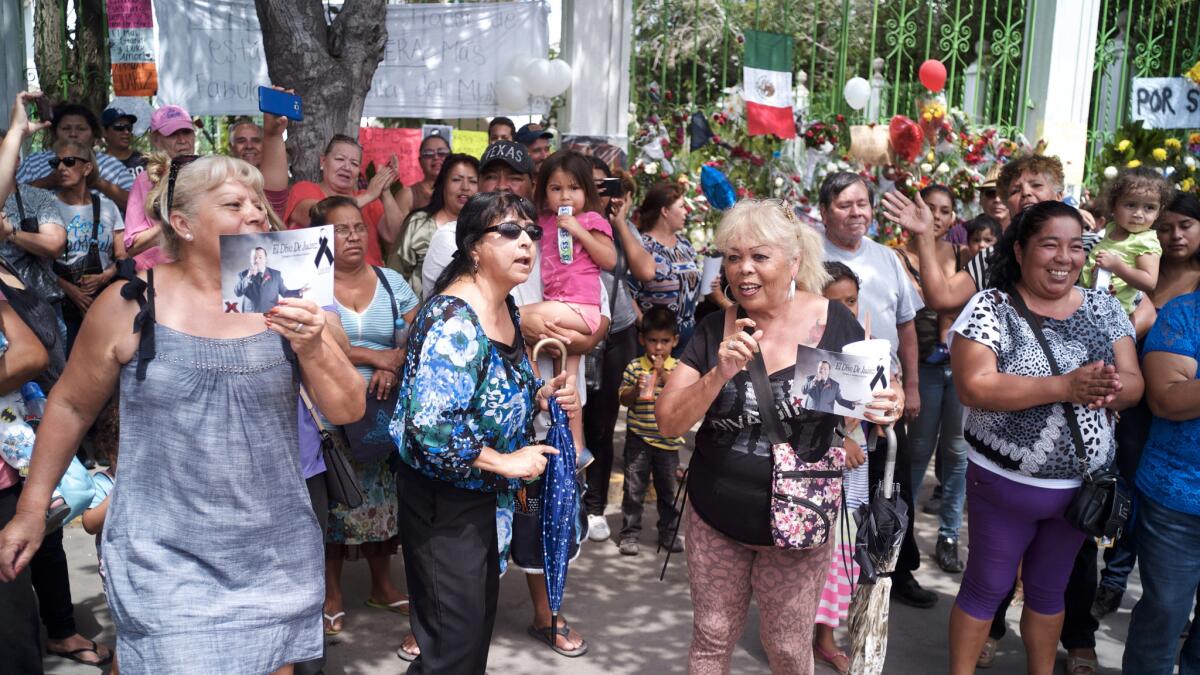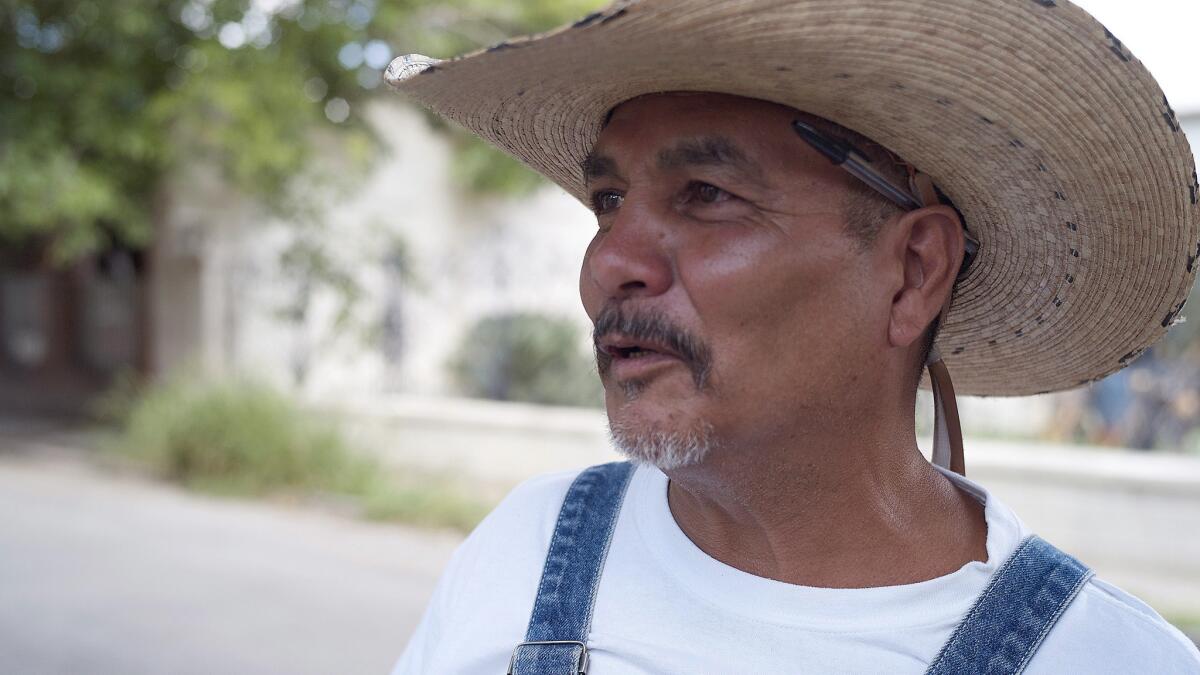Mexico mourns Juan Gabriel, the singer known as ‘El Divo de Juarez’

- Share via
Reporting from Ciudad Juarez, Mexico — Popular Mexican singer Juan Gabriel was known as “El Divo de Juarez,” and as news of his death spread Monday, more than 100 people gathered to mourn outside the block-long mansion that was his home in this border town — one of several he purchased in a city where his mother had once worked as a housekeeper.
They played songs they had come to know as their own: “La Frontera” and “Juarez Es Numero Uno.”
“I grew up hearing him. All my family and I followed him through his career and he was very beloved by us,” Estela Vejar, a 46-year-old Juarez resident, said as she lit a candle and left a balloon outside the fence.
The scene was one of several across Mexico as ardent fans commemorated the passing of the 66-year-old balladeer, who died in Santa Monica on Sunday just hours before he was set to perform to a sold-out crowd just across the border from here, in El Paso.
In Mexico City’s Garibaldi Square, a gathering place for mariachi, the bands played along as fans flocked to a statue of the singer and sang Juan Gabriel’s lyrics: “Love eternal and unforgettable.”
Alejandro Diaz, a musician for decades and a regular in the square, said a day doesn’t pass without a customer requesting Juan Gabriel, or “JuanGa.”
“He united people, it didn’t matter if they were people with lots of money or humble ones,” he said. “Everyone sings his songs and dances to the rhythm of ‘Noa Noa,’ or cries with one of his songs.”
Mexican President Enrique Peña Nieto paused during a tour of the state of Sinaloa to note the passing of “a great artist, recognized here and outside our borders … a man who in his lyrics, in his music, in his performances without a doubt projected the essence of the Mexican people.”
Ciudad Juarez, where Juan Gabriel launched his singing career at the iconic El Noa Noa bar, was once the murder capital of the world, plagued by cartel violence that in recent years has abated.
The singer had been remodeling his Spanish-tiled manse and had intended to live there, a relative said.
Instead, the sprawling house became a memorial where fans affixed flowers and signs to the ornate green gate saying, “The hour has arrived to say goodbye,” and “Rest in peace our Juan Gabriel.”
Vejar and her family last saw Gabriel perform at a free concert in Juarez last year that drew more than 138,000. “I didn’t want to waste another day and not come and honor him,” she said, her voice breaking as her daughter gave her a hug.
The street outside the house had been closed to traffic as mariachis and banda musicians played Juan Gabriel’s songs on horns, drums and accordion. Vendors also descended, selling flowers, photos and CDs.
Flower vendor Cruz Gonzalez, 44, recalled seeing Juan Gabriel perform at El Noa Noa when she was a teenager.
Standing nearby was Rosaura Diaz, 56, who was collecting money to hire mariachis to perform. Diaz said Gabriel was the only singer who could make her cry. He had special meaning for her beleaguered hometown, she said.
“He came to the city supporting it when the violence was heavy,” Diaz said. “And he never doubted his beloved city that helped him become a star.”
The youngest of 10 children, Juan Gabriel was placed in an orphanage at the age of 4, and went to work at 14 selling food on the streets to help his family. Later, he sang at local bars, including El Noa Noa on Avenida Juarez, which he would immortalize in song.
Locals normally did not linger in front of Juan Gabriel’s home, said Norma Angelica Guillermo, a resident of El Paso who has often traveled to Juarez. “We respect his house, it’s just part of the neighborhood. You see his house and say ‘Oh, that’s our El Divo, El Divo de Juarez.’”
Juan Gabriel built an orphanage in town, and started a music school. He appeared at the dedications of the local stadium, and last year at the unveiling of an enormous mural at the center of the renovated downtown.
Guillermo, 38, recalled growing up in El Segundo Barrio, a poor El Paso neighborhood along the river within sight of Juarez.
“Going to school, you would hear his songs coming from the houses. Saturday morning was cleaning to his songs,” she said. “He has a music for every generation.”
Last year, Guillermo—who works as a security specialist at a nearby NASA facility—took her mother to see Juan Gabriel at the University of Texas at El Paso arena, where he shouted to those from Juarez.
She also bought tickets for her mother and aunt to attend Sunday’s sold-out concert in El Paso. They only learned of the singer’s death when they pulled up to the arena. There, they joined some of the other 9,000 fans who had planned to attend, who instead found themselves singing “Siempre Estas en Mi Mente” (Always On My Mind).
Mourning with them at the arena was Lazaro Megret, the concert’s promoter, who had known Juan Gabriel for more than 25 years. Gabriel’s son and crew were already in town for the concert, he said. “They told us that he already sent the luggage to be put in his car to go to the airport.”
Megret recalled Gabriel as well-read, articulate and friendly. On tours, he said, “We used to go to dinner, telling stories back and forth — a great personality.”
Juarez Mayor Javier Gonzalez Mocken who said the singer’s death was a “great loss that will be deeply felt in this border town.” He called Juan Gabriel “one of Ciudad Juarez’s most brilliant sons, and the greatest Mexican composer that the country has produced over the last decades.”

Juan Gabriel’s 56-year-old nephew, Ricardo Donacio Aguilera, who grew up with the singer and has been taking care of his house. It was Juan Gabriel’s favorite place to stay when he performed in the area, he said. It reminded him of the early days of his career, and he felt safe there.
“There are photographs from important artists that he sang with. He has a big photo of [Mexican actress and singer] Maria Felix, which he took good care of, personal belongings that he left here,” Donacio Aguilera said.
The residence will probably become a museum, he added.
Guillermo said she hasn’t gone to Juarez much lately because of security concerns, but hopes to go with relatives this weekend “so we can pay our respects … just to feel a little closer to him.”
“He lived our life. So it’s hard,” she said, starting to cry. “He made it, though. He made us all proud.”
Hennessy-Fiske reported from Houston and Venegas reported from Ciudad Juarez. Special correspondent Cecilia Sanchez contributed reporting from Mexico City.
ALSO
Opinion: As a boy, I was taught to ridicule Juan Gabriel. As an adult, I revered him
‘No, that can’t be true’: Angelenos react to the death of Mexican crooner Juan Gabriel
From the archives: The ballad of Juan Gabriel
More to Read
Sign up for Essential California
The most important California stories and recommendations in your inbox every morning.
You may occasionally receive promotional content from the Los Angeles Times.











